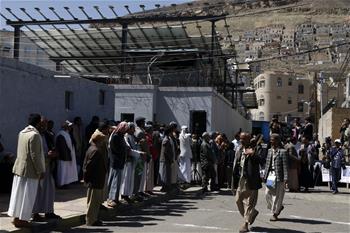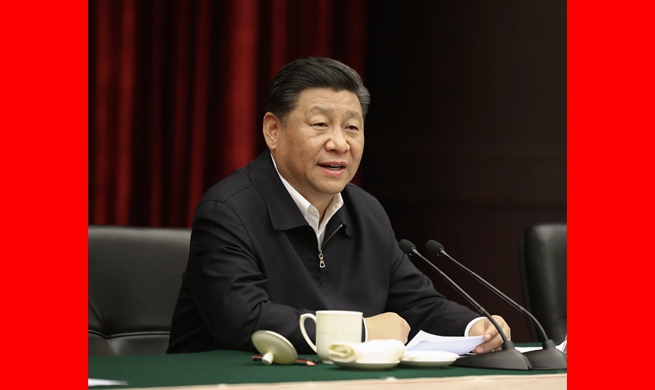ANKARA, April 18 (Xinhua) -- Turkey seeks to ease disputes with the United States over its decision to purchase Russian S-400 missile systems with fears that a standoff between the two NATO countries could exacerbate the economy in the country.
Turkey's ministers, including Finance and Treasury Minister Berat Albayrak, Defense Minister Hulusi Akar, and presidential spokesperson Ibrahim Kalin, paid a visit to Washington this week to attend a three-day business event.
The event was organized by the Foreign Economic Relations Board of Turkey, Turkey-U.S. Business Council, and American-Turkish Council.
Albayrak also met with U.S. President Donald Trump on Monday in order to deliver the messages of Turkish President Recep Tayyip Erdogan particularly on the issue of the purchase of Russian made S-400 anti-ballistic missile systems.
The United States threatens to suspend the delivery of the F-35 fighter jets to Turkey and impose additional sanctions if Ankara continues ahead with the purchase of the S-400 systems.
"I conveyed the messages of Erdogan and we had a positive and constructive meeting," Albayrak, also the Turkish president's son-in-law, told reporters.
Erdogan several times publicly stated that Turkey would go ahead with the S-400 deal, and accused the United States of "coaxing Ankara into abandoning the S-400 deal."
The delivery of the defense system will begin in June and the batteries will be deployed in Turkey in July, which is expected to trigger crucial crisis between Ankara and Washington.
Foreign Minister Mevlut Cavusoglu repeatedly said it was a "done deal" and noted there was no option of delivering these systems to a third country in order to avoid U.S. sanctions. However, the Turkish media recently circulates the scenario of Turkey's deployment of S-400 systems to another country.
Most recently, columnist of pro-government daily Sabah Okan Muderrisoglu indicated this scenario, naming Azerbaijan and Qatar as options.
He said that Turkey mulls formulas to address dispute with the United States.
"Although Turkey sees the S-400 deal as a done business and even though it declared that it will not compromise on its sovereignty rights, Turkey mulls some formulas that can overcome the crisis with the United States," Muderrisoglu wrote on Tuesday, when the Turkish delegation was still in talks in Washington.
"The option of finalizing the delivery of the S-400s but keeping them in Azerbaijan or Qatar is on the table," he added.
Given the stormy state of bilateral affairs with the United States, Turkey seeks financial support from American business circles and wants to avoid currency fluctuations over its vulnerable Turkish lira.
Albayrak also met with international investors and executives of funds on the sidelines of the International Monetary Fund-World Bank spring meeting in Washington.
In the event hosted by JP Morgan, Albayrak briefed the investors on his new economic reform package in order to convince them that the government will be able to restore the country's economy.
Turkey's lira has seen a crisis last year, sparked by strained U.S. diplomatic ties over a jailed American pastor, tumbling some 30 percent. The lira has again seen volatility after March 31 elections when the ruing party saw major losses in polls.
Turkey's economy "has no strength left" to cope with any possible turbulence over U.S. sanctions, according to Turkish economist Murat Muratoglu.
He reminded that the United States has several sticks to use against Ankara, such us a waiver by Washington granted for six months on Turkey's import of Iranian oil after U.S. imposed sanctions on Iran in November.
The waiver will last till May and Ankara seeks to extend it, an issue discussed during the Turkish delegation's visit to Washington.
Muratoglu noted possible sanctions over Turkey's gold trade with Venezuela, and a pending case of state-owned Halk Bank which can be a subject of penalty over a scheme to help Iran evade U.S. sanctions.
"The U.S. can propose one of them at any time," he added.













